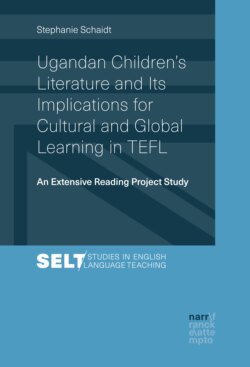Читать книгу Ugandan Children's Literature and Its Implications for Cultural and Global Learning in TEFL - Stephanie Schaidt - Страница 28
На сайте Литреса книга снята с продажи.
4.4.2 Fiction in a Realistic Mode
ОглавлениеThe adolescent years are characterised by many changes and challenges in Uganda as elsewhere. Questions of identity arise and young people develop their values and worldview. Many experiences young people in Uganda go through are universal. During puberty relationships with parents and elders change, peers gain in importance and young people have their first sexual experiences. Some of the young people are in school and study for their examinations and others struggle to find a job. Their life-style depends very much on their family background, level of education, gender, and also urban or rural residence.
The political and social situation in postcolonial Uganda, however, also forces young people to take up roles that are reserved for adults in other parts of the world: The AIDS epidemic left behind many orphans who have to care for themselves and also for their younger siblings; they become parents at a very young age (see Chapter 4.4.2.3). In addition, some children are abused as soldiers in the war in Northern Uganda (see Chapter 4.4.2.5).
Besides folktales, there are many Ugandan children’s narratives which reflect upon adolescence in post-independence Uganda. In the following, selected topics and titles of this fiction in a realistic mode are presented. The list of titles and topics analysed is selective and focuses on the narratives that were chosen for inclusion in the extensive reading project only. The first part of the analysis is concerned with narratives that deal with issues of growing up, i.e. young adult love and the search for an identity. The next subchapter then looks into school stories. Other narratives that are analysed in the following encompass topics such as HIV/AIDS, the girl child and child soldiers in the war in Northern Uganda.
